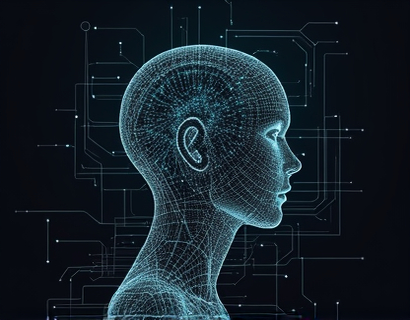Personalized AI Companions: Enhancing Creativity and Emotional Health in Children Through Interactive Digital Friends
In the digital age, technology has become an integral part of children's lives, offering new opportunities for learning, entertainment, and personal growth. One innovative approach that has gained attention is the development of personalized AI companions designed to boost kids' creativity and emotional well-being. These AI-driven imaginary friends provide a unique blend of interactive companionship and educational value, fostering imaginative play and social skills in a safe digital environment.
The concept of AI companions for children is rooted in the understanding that interactive and personalized interactions can significantly impact a child's cognitive and emotional development. Unlike traditional toys or digital entertainment, AI companions can adapt to a child's interests, abilities, and emotional needs, offering a tailored experience that promotes growth and learning. This article delves into the benefits of these AI companions, exploring how they can transform a child's creativity and emotional health.
Fostering Imaginative Play
Imaginative play is a crucial aspect of childhood development, allowing children to explore their creativity, solve problems, and understand the world around them. AI companions serve as powerful tools in this process by providing a dynamic and responsive play partner. These digital friends can engage in a wide range of activities, from storytelling and role-playing to creative challenges and games.
For instance, a child can imagine a world where they are an astronaut on a mission to Mars, and the AI companion can act as the mission control, providing real-time feedback and suggestions. This interaction not only sparks creativity but also encourages critical thinking and problem-solving skills. The AI's ability to adapt to the child's ideas and expand on them ensures that the play remains engaging and stimulating.
Moreover, the interactive nature of AI companions means that children are not passive recipients of content but active participants in the creative process. This active engagement is vital for developing a strong sense of imagination and innovation, skills that are increasingly important in a rapidly changing world.
Supporting Social Skills Development
Social skills are another area where AI companions can make a significant impact. Children often learn social skills through interactions with peers, but AI companions can provide a safe and controlled environment for practicing these skills. The AI can simulate conversations, role-play different social scenarios, and offer feedback on communication techniques.
For example, a child struggling with initiating conversations can practice starting a chat with the AI companion, receiving guidance on appropriate topics and responses. This practice can boost the child's confidence and competence in real-world social situations. Additionally, the AI can adapt the difficulty level of the scenarios based on the child's progress, ensuring a gradual and supportive learning curve.
The emotional support provided by AI companions is also noteworthy. Children often feel more comfortable expressing their feelings to a digital friend, which can be particularly beneficial for those who may struggle with verbal communication or have anxiety in social settings. The AI can listen, validate emotions, and offer reassurance, creating a safe space for emotional exploration and expression.
Promoting Emotional Well-Being
Emotional well-being is a critical component of a child's overall development, and AI companions can play a role in nurturing this aspect. By providing a consistent and non-judgmental presence, these digital friends can help children manage stress, anxiety, and other emotional challenges. The AI can engage in conversations about feelings, suggest coping strategies, and even guide mindfulness exercises.
Personalization is key to the effectiveness of AI companions in this regard. The AI can learn a child's emotional patterns and triggers, offering tailored support and resources. For instance, if a child frequently expresses feelings of sadness, the AI can introduce calming activities or positive affirmations specifically designed to address these emotions.
Furthermore, the ability to create and customize digital avatars allows children to express their identity and emotions in a way that feels safe and controlled. This creative outlet can be particularly therapeutic, helping children process and understand their feelings more deeply.
Ensuring a Safe Digital Environment
One of the primary concerns for parents and guardians when it comes to digital interactions is safety. AI companions are designed with robust safety measures to ensure a secure and positive experience for children. These measures include strict content filtering, monitoring for inappropriate behavior, and adherence to privacy standards.
The AI operates within a predefined set of guidelines and cannot engage in harmful or inappropriate interactions. Parents can also set boundaries and monitor the interactions, providing an additional layer of oversight. This combination of technology and parental involvement helps create a balanced and safe digital environment for children.
Moreover, the data collected from these interactions is used solely to enhance the AI's performance and provide better support. There is no data sharing or commercial use, ensuring that children's privacy is respected and protected.
Encouraging Healthy Screen Time Habits
While digital companions offer numerous benefits, it is essential to promote healthy screen time habits. Overuse of any digital device can have negative effects on a child's physical and mental health. To address this, AI companions can be integrated with tools that monitor and manage screen time, encouraging breaks and balancing digital interactions with offline activities.
Parents can set time limits, schedule regular breaks, and encourage complementary activities such as reading, outdoor play, or creative hobbies. The AI can even suggest these activities, helping children develop a well-rounded routine that includes both digital and physical engagement.
Conclusion
Personalized AI companions represent a promising frontier in children's technology, offering a blend of creativity, emotional support, and educational value. By providing interactive and adaptive companionship, these digital friends can significantly enhance a child's imaginative play and emotional well-being. As the technology continues to evolve, it is essential to approach its integration with a focus on safety, privacy, and balanced use.
For parents and guardians, the potential of AI companions to support their child's development is substantial. By embracing these innovative tools, we can help children navigate the digital world with confidence, creativity, and emotional resilience.











































